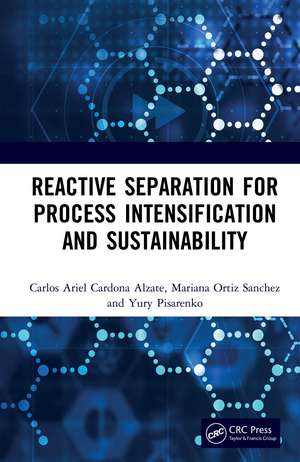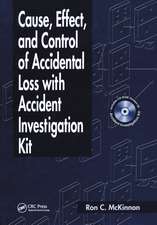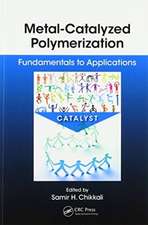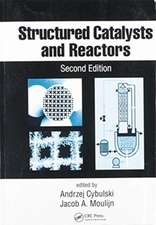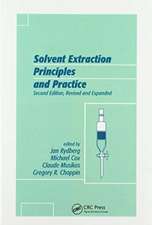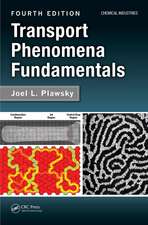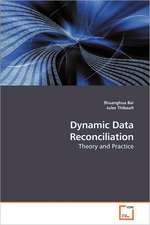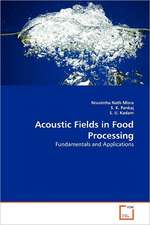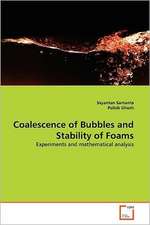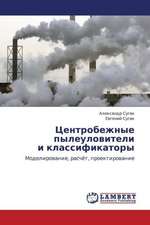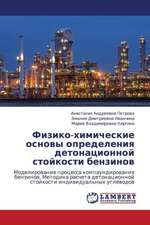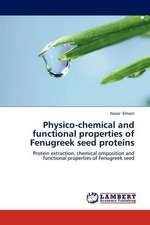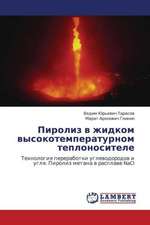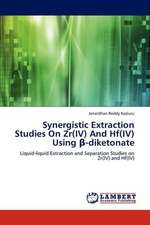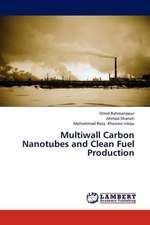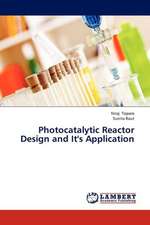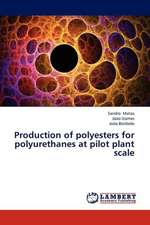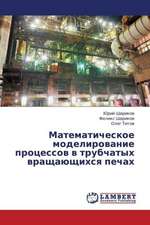Reactive Separation for Process Intensification and Sustainability
Autor Carlos Ariel Cardona Alzate, Mariana Ortiz Sanchez, Pisarenko Yury Andrianovichen Limba Engleză Hardback – 12 dec 2019
Preț: 875.55 lei
Preț vechi: 1178.12 lei
-26% Nou
Puncte Express: 1313
Preț estimativ în valută:
167.53€ • 174.92$ • 138.66£
167.53€ • 174.92$ • 138.66£
Carte tipărită la comandă
Livrare economică 04-18 aprilie
Preluare comenzi: 021 569.72.76
Specificații
ISBN-13: 9780367281519
ISBN-10: 0367281511
Pagini: 224
Ilustrații: 61
Dimensiuni: 156 x 234 x 19 mm
Greutate: 0.45 kg
Ediția:1
Editura: CRC Press
Colecția CRC Press
Locul publicării:Boca Raton, United States
ISBN-10: 0367281511
Pagini: 224
Ilustrații: 61
Dimensiuni: 156 x 234 x 19 mm
Greutate: 0.45 kg
Ediția:1
Editura: CRC Press
Colecția CRC Press
Locul publicării:Boca Raton, United States
Public țintă
Postgraduate and ProfessionalCuprins
1. Reactive separation processes as a key strategy for sustainable use of natural resources Definition, Advantages and disadvantages, Phenomenology. 2. Classification of reactive separation processes. Range of applications. Reactive separation processes in the industry. Design methods and strategies. Succeful cases improving process sustainability. 3. Reactive distillation. Uses and applications. Analysis of the statics. Modeling and simulation. Case study. 4. Reactive extraction and extractive fermentation. Uses and applications. Conceptual design. Modeling and simulation. Case study. 5. Reactive absorption. Uses and applications. Conceptual design. Modeling and simulation. Case study. 6. Reactive adsorption. Uses and applications. Conceptual design. Modeling and simulation. Case study. 7. Reactive membranes. Uses and applications. Conceptual design. Modeling and simulation. Case study. 8. Supercritical fluids extraction and reaction. Conceptual design. Modeling and simulation. Case study. 9. Reactive separation processes for biomass conversion and biorefineries. 10. Future and perspectives.
Notă biografică
Carlos A. Cardona Alzate is full professor in Chemical Engineering Department at the Universidad Nacional de Colombia at Manizales since 1995. He received M.Sc. and Ph.D. degrees in Chemical Engineering from the Moscow State Academy of Fine Chemical Technology M.V. Lomonosov in 1994. From 1996 to 1997, he worked at Universidad de Caldas supporting a new program in Food Engineering. Dr. Cardona’s research focuses on developing non-conventional separation processes, thermodynamics, integration processes, process engineering, biorefineries, climate change and agroindustry. In particular, he has worked on different research projects concerning the chemical and biochemical process design, biofuels research and development, economic and sustainable utilization of Colombia agroindustrial wastes. He has authored and co-authored over 180 research papers as well as 12 research books and 44 book chapters. Additionally, he has presented over 250 works at scientific events. Currently, he leads the research group in Chemical, Catalytic and Biotechnological Processes (PQCB) at Universidad Nacional de Colombia at Manizales.
Pisarenko Yuri Andrianovich is a full professor at the Department of Chemistry and Technology of Basic Organic Synthesis at the Moscow Institute of Fine Chemical Technology named after MV Lomonosov (MITHT). He was awarded the degree of doctor of technical sciences in 1998. Currently, he is the leader of a research team engaged in the research and development of combined reaction-distillation processes. They established static laws of reaction and mass transfer systems, formulated the necessary and sufficient conditions for the emergence of chemiazeotropes in these systems. Studies carried out under the direction of Yu.A. Pisarenko allowed to formulate a strategy for choosing the best options for organizing reaction-mass transfer processes and implement it as a software product. Pisarenko Yu.A. for the first time, discovered and predicted the phenomenon of poly-stationarity in reactive distillation processes, including its mechanism. Additionally, he developed a criterion for predicting a similar phenomenon. He carried out a rigorous proof of the validity of the rule of azeotropy for two-dimensional manifolds, which represent concentration complexes of different structures. He obtained a new form of the rule of azeotropy for simplicial complexes of high dimensions. Pisarenko Yu.A developed technologies for a number of industrial reactive separation processes, in particular, the RS process of isomerization of the C5 – C6 fraction of paraffin hydrocarbons in order to obtain a high-octane additive to motor fuels. The results of the research of Professor Pisarenko are presented in more than 200 scientific publications, in monographies and in textbooks.
Mariana Ortiz Sanchez received Chemical Engineer degree from Universidad Nacional de Colombia at Manizales in 2017. Ortiz’s research focuses on processes engineering, process modelling and simulation, design and analysis of biorefinery configurations considering technical, economic, environmental and social aspects and thermodynamic-topological analysis. She has authored and co-authored over 4 research papers as well as 4 book chapters. She has given over 10 works in scientific events, she is Master candidate in Engineering - Chemical Engineering at Universidad Nacional de Colombia at Manizales.
Pisarenko Yuri Andrianovich is a full professor at the Department of Chemistry and Technology of Basic Organic Synthesis at the Moscow Institute of Fine Chemical Technology named after MV Lomonosov (MITHT). He was awarded the degree of doctor of technical sciences in 1998. Currently, he is the leader of a research team engaged in the research and development of combined reaction-distillation processes. They established static laws of reaction and mass transfer systems, formulated the necessary and sufficient conditions for the emergence of chemiazeotropes in these systems. Studies carried out under the direction of Yu.A. Pisarenko allowed to formulate a strategy for choosing the best options for organizing reaction-mass transfer processes and implement it as a software product. Pisarenko Yu.A. for the first time, discovered and predicted the phenomenon of poly-stationarity in reactive distillation processes, including its mechanism. Additionally, he developed a criterion for predicting a similar phenomenon. He carried out a rigorous proof of the validity of the rule of azeotropy for two-dimensional manifolds, which represent concentration complexes of different structures. He obtained a new form of the rule of azeotropy for simplicial complexes of high dimensions. Pisarenko Yu.A developed technologies for a number of industrial reactive separation processes, in particular, the RS process of isomerization of the C5 – C6 fraction of paraffin hydrocarbons in order to obtain a high-octane additive to motor fuels. The results of the research of Professor Pisarenko are presented in more than 200 scientific publications, in monographies and in textbooks.
Mariana Ortiz Sanchez received Chemical Engineer degree from Universidad Nacional de Colombia at Manizales in 2017. Ortiz’s research focuses on processes engineering, process modelling and simulation, design and analysis of biorefinery configurations considering technical, economic, environmental and social aspects and thermodynamic-topological analysis. She has authored and co-authored over 4 research papers as well as 4 book chapters. She has given over 10 works in scientific events, she is Master candidate in Engineering - Chemical Engineering at Universidad Nacional de Colombia at Manizales.
Descriere
This book describes, analyses and discusses the principles, phenomena and design strategies of reactive separation processes with an emphasis on the intensification as a basis of the sustainability. The overall sustainability of reactive separation processes in the industry is also included.
